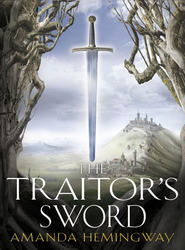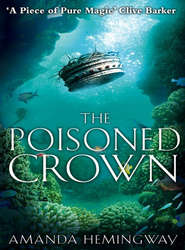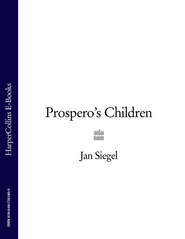По всем вопросам обращайтесь на: info@litportal.ru
(©) 2003-2024.
✖
The Greenstone Grail: The Sangreal Trilogy One
Автор
Год написания книги
2018
Настройки чтения
Размер шрифта
Высота строк
Поля
Even so, the need to confide might have been too much for him, if he had found Bartlemy alone when he returned to Thornyhill. But in the living room he found Rowena Thorn, Mrs Vanstone to give her proper name, drinking tea and talking earnestly about something. She was a long, lean, tweedy sort of woman in her mid-sixties, with a face which had once been plain, until character and humour had left its impress on her features. She was given to serving on committees, organizing, charitable events, and riding her friends’ horses since she no longer maintained one of her own. In between, she ran an antiques shop in Chizzledown. She greeted Nathan absent-mindedly, though she normally found time to inquire after his progress at school, and reverted immediately to the former subject under discussion.
‘The provenance is clear: they have all the necessary documentation. It is the genuine article, I’m sure of it. You’ve seen our records. That awful little tit Rowland sold it to this Birnbaum chap just before the war – he was a German, too, frightfully bad form if you ask me – and then went and got himself killed, silly business really, survived the Somme and then got run over by a tank or something in the week before the Armistice. Henry died in the ’flu epidemic and that was more or less the end of the family. My father was only a child at the time, besides being just a cousin, and there was nothing left for him to inherit but debts. My grandmother always said that when we lost the cup we lost our luck, but personally I’ve never been sure about that. I remember Great-aunt Verity contended it was our curse, an evil burden the family had a duty to bear. Probably all nonsense, but you never know. The point is, it’s ours, and if it really has resurfaced I’m damn well going to get it back.’
Nathan, who was becoming interested, helped himself to some elderflower cordial from the kitchen (Bartlemy made his own) and sat down unobtrusively next to Hoover.
‘But if Rowland Thorn sold it, as you maintain,’ Bartlemy was saying, ‘I don’t quite see how you can make a claim. Unless you can manage to buy it back from the present owner?’
‘Good Lord, no, it’s practically priceless. According to what I hear, the British Museum is after it, but it may be too much for their budget. Depends on the other bidders, of course: might go for a song, might run into millions. No: I’m trying another tack. I intend to prove the original sale was actually illegal.’
‘How will you do that?’ Bartlemy asked.
‘As you know, old Josevius acquired the cup somewhere back in the Dark Ages. Given to him by the Devil, one story has it; another one says it was an angel.’
‘I read it was supposed to be a holy relic,’ Nathan said. He found it curiously difficult to speak of it, as if there were weights on his tongue. Yet he wanted to. He wanted to say: I found the chapel. I saw the cup. He couldn’t. Hoover, he noticed, merely looked inquiringly at him.
‘Depends which story you favour. Didn’t know you were interested in my family history, Nathan. Good for you. Too many kids your age only want to play computer games and listen to pop music, far as I can see. History’s important. The past belongs to all of us. Where was I?’
‘Josevius,’ Bartlemy prompted.
‘Right. Well, he got the cup, somehow or other. Some sources say he made it, but I don’t believe that. Never been any craftsmen in our family: we haven’t the brains. Anyway, story goes he charged his descendants to hold it in trust, though heaven knows for whom – or what – never to sell it, or lend it, or give it away, or we would lose everything. Should have been kept in the ancient chapel, but that was destroyed, so they had it here, that secret cupboard in the chimney, you’ll have found it –’
Nathan’s eyes widened. ‘I didn’t know there was a –’
‘I did,’ said Bartlemy. ‘Yes, I found it. I always wondered what it was for.’
‘Never saw it myself but my great-aunt spoke of it. Must show me some time. The cup stayed there for centuries; strangers weren’t even allowed to look at it. Lot of odd legends grew up around it, but mostly they stayed in the family. Somewhere along the line it got labelled the Sangreal: couple of historians picked up on that one, said it meant Saint Grail, the Holy Grail, but they got the etymology wrong. The word comes from sang, blood. That’s French, Nathan, but it’s a similar word in a dozen languages. Rumour was, if you were going to die, or some catastrophe was imminent, you’d look in the cup and see it full of blood. Nothing holy about that. It’s all been written down, from time to time, by those of my ancestors who could read and write. Not a bright lot, the Thorns, I’m afraid. Point is, at some stage in the fifteenth century the issue of selling it must have come up, and one of them made the injunction against it legal. I don’t have the document, but there are two separate references to it, one in the diary of a contemporary, the other in the account of an attempted purchase in the Victorian era. The document existed: no question about it. Hopefully it still does. Wondered if you’d mind my having a look for it here?’
‘Of course not,’ Bartlemy said. ‘But I’m pretty sure I’ve been through all the papers in the house, and I’ve never seen such a thing.’
‘Can I help?’ Nathan asked. ‘It could be in another secret hiding place, like that cupboard you mentioned.’
‘Could be,’ said Rowena Thorn. ‘Any help is welcome. Think it’s like an adventure story, do you? Harry Potter and the Cup of Blood, that kind of thing?’
Nathan only smiled in answer. He thought: Harry Potter has magical powers. His friends have magical powers. Me – I have to dream carefully. He ached to tell them about the chapel, and his vision there – if it was a vision – but the words would not come. He reflected that real adventures weren’t about good guys and bad guys. Real adventures were shadows and confusion and doubt, and a terrifying personal responsibility.
Maybe there’s an injunction on my talking of the cup. Not legal, but magical. Or some sort of hypnotism …
‘Who’s got – it – now?’ he inquired. ‘I’m sorry if you’ve already told Uncle Barty, but I missed that part. Or – or is that private information?’
‘Lord, no: it’s public enough. It’s some Austrian chap, father’s a count, Graf they call it, grandfather was in the SS. The Birnbaums were a Jewish family, very wealthy, major collectors, paintings, antiques, the lot. The Nazis did for them, of course, and the grandfather – Graf Von Holsten-Pils or whatever he called himself – pocketed most of the loot. After he died the next count seems to have kept a low profile, hoped the stolen goods would pass unnoticed among the rest of the ancestral heirlooms. He had a stroke last year, family fortunes on the wane, son decides to auction off some of the silver. Gets in touch with Sotheby’s – not sure why he picked on London, maybe there’s a Birnbaum who’s been sniffing around back in Germany, maybe he just thinks he’ll get more money. Apparently a lot of the stuff is originally English. Anyway, he shows them the cup with the provenance – perhaps he thinks granddad got it legally – and a chum of mine there gets hold of me. Wanted to check it out, had no idea I might have a claim. Haven’t told him, of course. Want to get my hands on that injunction first. Never fire till you can see the whites of their eyes, so my father used to say. Mind you, he was talking about stag-hunting, not warfare.’
‘Is this war, Rowena?’ Bartlemy asked mildly. ‘Do you really believe this cup is the luck of the Thorns?’
‘I’m an antique-dealer,’ she said. ‘It’s a valuable antique – could be unique – and it was the property of my family. It should be again. Don’t know about luck. My father believed-my grandfather believed. I’m a sceptic about most things, but the belief is there: it’s in my blood. It always comes down to blood, when you talk about the cup. Supposing it was the Grail – if there is such a thing …’
‘That’s the question,’ said Bartlemy. ‘The blood of Christ-whoever he was …’ His voice sounded very distant.
Nathan sat like a stock, unable to move. His tongue seemed to stick to the roof of his mouth. He wanted to say something – anything – to cry out and break through the spell or trance, but the harder he tried, the more difficult it became.
‘You’re a sceptic, like me,’ Rowena Thorn was saying. ‘No evidence for any Grail, nothing but stories. Great-aunt Verity said Josevius could have been Joseph of Arimathea, the chap who’s supposed to have retrieved the Grail relics and brought them to England. How d’you work that out? said my father. We know Josevius died around 660 AD – forget the precise date, but it’s set down somewhere. If he was around for the Crucifixion he’d have been getting on a bit.’
‘How does family legend deal with that one?’ Bartlemy said.
‘Sold his soul to the Devil – told you the Devil came into it – lived for centuries. Even the stories are rubbish, you see. In charge of holy relics one minute, in the pay of Satan the next. None of it stands up.’
‘What did your great-aunt have to say about it?’ Bartlemy wondered. ‘Do you remember?’
‘Said the Grail was evil, not holy. King Arthur and co. got it wrong. She was a devout Christian: thought it was a pagan thing. Souvenir from the scene of the crime – most terrible crime in history. She thought we had to keep it from doing harm. Went a bit batty in her old age. Still, it made sense to her.’
‘Has the cup ever been carbon-dated?’ Bartlemy said thoughtfully.
‘Shouldn’t think so. Unless the Grafs had it done. Funnily enough, my chum at Sotheby’s was talking about that. If the cup’s two thousand years old, might really be a candidate for the Grail legend. On the other hand, if it was made in the Dark Ages …’
‘Exactly.’
‘Doesn’t make any odds to me, though. Belongs to the Thorns, whatever it is.’ An obstinate look settled about her mouth, erasing some of the humour. ‘Must get it back,’ she muttered to herself.
Nathan, finding he could move again, fidgeted in his chair, extending a hand to ruffle Hoover’s fur.
‘Still want to help me out?’ Rowena Thorn asked him. ‘Not as good as buried treasure, looking for a piece of paper, but it might mean treasure for me. There’d be a reward in it, promise you that …’
‘It’s okay,’ Nathan said. ‘I don’t want a reward. I’ll look anyway.’
‘Good man. Teach you the right stuff at Ffylde, do they? Better than the comprehensive at Crowford, any day. All they seem to do there is take drugs and beat up the teachers.’ As Hazel and George were both there, Nathan knew this was an exaggeration, but he didn’t say so.
‘He gets his principles from his mother,’ Bartlemy said gently.
Rowena Thorn set down her teacup. ‘Better be off,’ she said. ‘Thanks for everything, Bartlemy. You’ve always been a good friend.’
‘You don’t mind my living here, do you?’ he inquired curiously. ‘Your ancestral home …’
‘Good heavens no. Hardly a mansion, is it? The Thorns never had the money for that. Just inconvenient, hell to maintain – never dared ask you about the plumbing. It isn’t as if I ever lived here myself. No sentiment involved.’
‘You never owned the cup, either,’ Bartlemy pointed out.
‘That’s different,’ she said. ‘I told you. That’s a matter of blood.’
At supper that night, Nathan told Annie about the cup of the Thorns – it didn’t appear to be a secret – or as much as he was able to tell, without talking about his vision, or the dreams of blood. Hazel was there; George came later. They both absorbed the story with enthusiasm and determined to search for the missing injunction. ‘D’you think it will be, like, a piece of parchment?’ George said. ‘A scroll or something, yellowing and with spiky writing.’
‘It’s fifteenth century,’ Nathan said. ‘I think they had paper in the fifteenth century. When did what’s-his-name invent the printing press?’
‘Caxton,’ Annie said, ‘in the fifteenth century. There was a lot going on then. Would anyone like some ice cream?’
Not surprisingly, everyone did. ‘Have you ever had a book here as old as that?’ Hazel asked when the ice cream had been shared out.
‘No. I had a seventeenth century two-volume history once: that was the oldest. Anything from the fifteenth century would probably be in a museum. Does Rowena have any idea what this document looks like?’
‘Don’t think so,’ Nathan said. ‘We’ll just have to go through absolutely everything at Thornyhill.’










